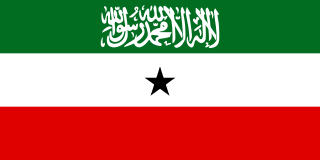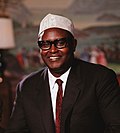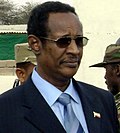
Politics of Djibouti takes place in a framework of a presidential representative democratic republic, whereby the executive power is exercised by the President and the Government. Legislative power is vested in both the Government and the National Assembly. The party system and legislature are dominated by the socialist People's Rally for Progress. In April 2010, a new constitutional amendment was approved. The President serves as both the head of state and head of government, and is directly elected for single six-year term. Government is headed by the President, who appoints the Prime Minister and the Council of Ministers on the proposal of the latter. There is also a 65-member chamber of deputies, where representatives are popularly elected for terms of five years. Administratively, the country is divided into five regions and one city, with eleven additional sub-prefecture subdivisions. Djibouti is also part of various international organisations, including the United Nations and Arab League.

Somaliland, officially the Republic of Somaliland, is an unrecognised country in the Horn of Africa. It is located in the southern coast of the Gulf of Aden and bordered by Djibouti to the northwest, Ethiopia to the south and west, and Somalia to the east. Its claimed territory has an area of 176,120 square kilometres (68,000 sq mi), with approximately 6.2 million people as of 2024. The capital and largest city is Hargeisa.

Dahir Riyale Kahin is a Somaliland politician who was President of Somaliland from 2002 to 2010. He previously served as a senior officer in the National Security Service in Somalia, and he was Vice President of Somaliland from 1997 to 2002

Parliamentary elections were held in Sri Lanka on 2 April 2004. The ruling United National Party of Prime Minister Ranil Wickremesinghe was defeated, winning only eighty two seats in the 225-member Sri Lankan parliament. The opposition United People's Freedom Alliance won 105 seats. While this was eight seats short of an absolute majority, the Alliance was able to form a government.

The Somali Republic was formed by the union of the Trust Territory of Somaliland and the State of Somaliland. A government was formed by Abdullahi Issa Mohamud and Muhammad Haji Ibrahim Egal and other members of the trusteeship and protectorate administrations, with Haji Bashir Ismail Yusuf as President of the Somali National Assembly and Aden Abdullah Osman Daar as President of the Somali Republic. On 22 July 1960, Daar appointed Abdirashid Ali Shermarke as prime minister. On 20 July 1961 and through a popular referendum, Somalia ratified a new constitution, which was first drafted in 1960. The new constitution was rejected by Somaliland.

Parliamentary elections were held in Somaliland on 29 September 2005. They were the first multiparty parliamentary election conducted in the country.

The Justice and Welfare Party, sometimes translated as the Justice and Welfare Association, and also known as For Justice and Development, is the oldest political party in Somaliland. The party tends to be supported by people from the Cidagale and Garxajis and some sub-clans of the Isaaq.

The Kulmiye Peace, Unity and Development Party, also known as simply Kulmiye, is a political party in Somaliland. The party was founded by Ahmed Mohamed Mohamoud "Silanyo" in May 2002, ahead of the first municipal elections later that year. The party is mainly supported by people from the Habr Je'lo, Habr Awal and Darod clans.

Ahmed Mohamed Mohamoud, known by his nickname Silanyo, was a Somaliland politician who served as the President of Somaliland from 2010 to 2017. He was a long-time member of the government in Mogadishu, having served as Minister of Commerce of Somalia in the 1960s, and among other Cabinet positions. During the 1980s, he also served as the Chairman of the Somali National Movement.

The politics of Somaliland take place within a hybrid system of governance, which, under the Somaliland constitution, combines traditional and western institutions. The constitution separates government into an executive branch, a legislative branch, and a judicial branch, each of which functions independently from the others.

Presidential elections were held in Somaliland on 14 April 2003. The result was a victory for incumbent President Dahir Riyale Kahin, who won by a margin of just 0.01%. The outcome was initially rejected by the main opposition, which led to violence and a subsequent ban on public protests for a ten-day period starting on 22 April. Nevertheless, the International Crisis Group labeled the election a democratic "milestone" for the breakaway state. On 11 May the Somaliland Supreme Court endorsed Kahin's victory. He was sworn in on 16 May.

The vice president of Somaliland is the deputy head of state of Somaliland and the second highest official next to the president. The vice president is the constitutional successor of the president of Somaliland in case of a vacancy.

Abdirahman Mohamed Abdullahi, colloquially known as Irro, is a Somaliland politician and diplomat who has been the 6th and current President of Somaliland since 12 December 2024.

The Somaliland National Party, sometimes referred to as the Waddani National Party and better known by its shortened Somali form Waddani, is a political party in Somaliland. The party was founded by Abdirahman Mohamed Abdullahi (Irro) in 2012, ahead of the second municipal elections later that year. On 16 November 2021 Hersi Ali Haji Hassan was elected as the new chairman of the opposition party.

Parliamentary elections were held in Somaliland on 31 May 2021, alongside local district elections. The election was Somaliland's first parliamentary election since 2005, and politicians pointed to the election as evidence of its political stability. Three parties – the populist Somaliland National Party (Waddani), the centre-left Justice and Welfare Party (UCID), and the ruling party, the liberal Kulmiye Peace, Unity, and Development Party – put forward 246 candidates who competed for 82 seats in the House of Representatives. More than one million people, out of about four million residents total, registered to vote. On 6 June, the National Electoral Commission (NEC) announced that Waddani had received a plurality of seats with 31; Kulmiye received 30, and UCID received 21. As no party had received an outright majority, Waddani and UCID announced they would form a political alliance.

Municipal elections were held across Somaliland on 15 December 2002. Six political associations fielded 2,368 candidates to contest 379 local council seats in nineteen of Somaliland's twenty-three electoral districts.
Events in the year 2021 in Somaliland.

The Government of the Republic of Somaliland (JSL) is the central government of Somaliland. The Government of Somaliland consists of legislative, executive, and judicial branches, each of which functions independently from the others. The Government runs under the framework established by the Constitution of Somaliland, adopted in 2001. It is a unitary state. The seat of the government is located in Hargeisa, the capital of Somaliland.

Presidential elections were held in Somaliland on 13 November 2024. In the election, incumbent President Muse Bihi Abdi of the Kulmiye party was seeking a second and final term in office against the opposition candidates Abdirahman Mohamed Abdullahi "Irro" of the Waddani party, and Faysal Ali Warabe of the UCID party. The election was held concurrently with an election to determine the three national political parties for the next decade.



















